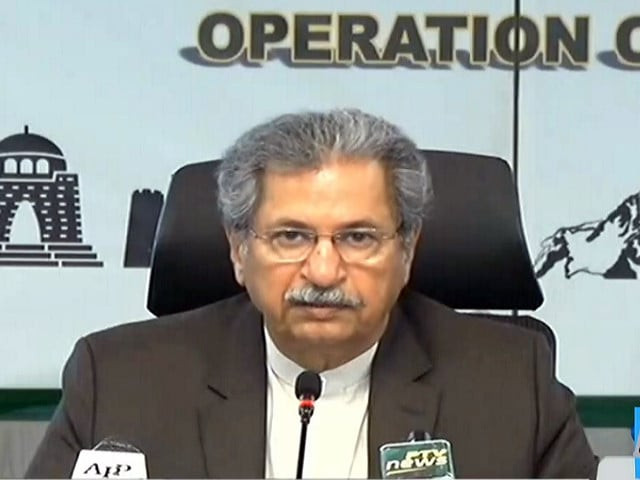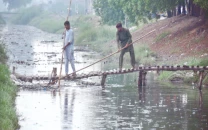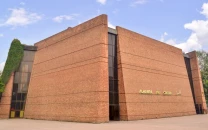Exams put off till June 15
Exams across the country postponed till June 15

The federal government has announced more stringent measures to turn the tide of the third wave of Covid-19, postponing all exams till June 15, and banning tourism, closing shopping malls and parks, and shutting down inter-city as well as inter-provincial transport over the Eidul Fitr holidays next month.
The decisions were taken a meeting of the education and health ministers at the National Command and Operation Centre (NCOC) which serves as the nerve centre of the government’s unified effort against the pandemic.
Later, Education Minister Shafqat Mahmood and Special Assistant to Prime Minister on Health Dr Faisal Sultan informed the media about the decisions. Mahmood told reporters that the government had decided to postpone all exams till June 15.
He added that another meeting would be held at the end of May to review the pandemic situation in the country and further decision, in this regard, would be taken. He added that depending on the spread of the disease, the date of exams may even be pushed back further.
He said that Cambridge exams have also been postponed till Oct/Nov for all grades, adding that the exception had been given to those students who are in AAT 2 (Association of Accounting Technicians) level because they have to take the exam now.
Accordingly, the education minister said the university exams would be aligned with Class-XII. “No one will lose the [academic] year,” the minister said. “For AAT 2, every attempt will be made to provide safe venues [for the exams].”
The minister said that Cambridge exams will also be held in Oct-Nov cycle. He added that Cambridge had announced that extra fees would not be charged from the students shifting their exams to October-November.
Read: Students can defer their May/June Cambridge exams to Oct/Nov: Shafqat Mahmood
“Many parents will be relieved that their children will not appear for exams at a time when the virus is at its peak,” the minister said. “The decision has been taken in a collective spirit and in the best interests of the students’ future.”
Oxygen production
Speaking on the occasion, Dr Sultan said the government was increasing the country’s oxygen production capacity in order to support the country’s healthcare system. He added that work on logistics for oxygen supply was ongoing so that there were no hindrances in the supply chain.
Dr Sultan told reporters that the oxygen plant at the Pakistan Steel Mills (PSM) would be re-activated to meet the demand. “Using non-essential industries and importing oxygen can also be used to increase the supply,” he added.
The oxygen supply situation was also discussed in the federal cabinet meeting, chaired by Prime Minister Imran Khan. Briefing the media about the cabinet decisions, Information Minister Fawad Chaudhry said the oxygen could be imported from Iran and China if there was any shortage.
Fawad said the country’s oxygen supply had been doubled with the increase in the number of ventilator beds by 7,000 in the last one year. “[A total of] 792 metric tons of oxygen is being produced every day. If more is required, the supply to industries will be reduced,” he added.
Meanwhile, Dr Sultan said the government was not dependant only on the donations or the gifts of Covid-19 vaccine. “This is not true. The government has purchased about three million vaccine doses, while deals have been signed to purchase 30 million more doses,” he told reporters.
He stressed that that the process of procuring vaccines was slow because of the overall shortage around the world. “It does not matter how much money one has. If a thing does not exist, you cannot buy it,” he said, adding that due to shortage, vaccine rollout under the COVAX programme had also been delayed.
Eid holidays
The NCOC also announced new Covid-related restrictions on the occasion of Eidul Fitr, placing a ban on tourism, shutting inter-provincial as well as inter-city transports, closing all shopping malls and parks during the upcoming holidays.
In pursuance of the decisions taken by the forum, the interior ministry issued a notification of the new measures to be enforced during May 8-16 period – the last week of Ramazan and the Eid holidays. The ministry said that there would be a ban on tourism during May 8-16 period. All the tourist spots, resorts, hotels, public parks, restaurants and shopping malls will remain closed, it said.
Special attention will be given to Murree, Galyat, Swat, Kalam, coastal areas as well as the northern areas. According to the notification, local residents, especially those from Gilgit-Baltistan, will be allowed to travel. Inter-provincial and inter-city transport will also be shut during the Eid holidays, the notification said. It was decided in the NCOC meeting that uninterrupted power supply would be ensured during the Eid holidays.
Fawad said that the government was considering five-day Eid holidays this year, adding that long holidays would ease the burden on the cities as the pandemic was an urban phenomenon. “The government is trying hard to avoid a complete lockdown and that is why it is considering five-day holidays on Eid.”
Earlier, the cabinet received briefings about the latest coronavirus situation from Dr Sultan and Planning Minister Asad Umar, who heads the NCOC. The cabinet was informed that around 5,000 Covid patients were in critical condition, which was the highest number as compared with the last two waves of the contagion when the maximum number of serious patients remained 3,400.
Fawad said that so far two million people had been vaccinated against Covid-19. “People must get themselves vaccinated against the virus. Around one billion people across the world have so far been immunised against the disease,” he elaborated.
He said 3.7 million doses of the coronavirus vaccine were available in the country and now the people aged 40 and above were eligible for vaccination. He appreciated the role of the print and electronic media in creating awareness among the public about Covid-19 standard operating procedures (SOPs).
The information minister told reporters that the cabinet gave its nod to deployment of army to assist the civilian administration in enforcing the Covid-19 SOPs. The minister also approved the price of Russia’s Sputnik V vaccine at Rs8,449 for two doses. The minister said that Prime Minister Imran had issued directions for ensuring the supply of essential items amid the pandemic.
Coronavirus first emerged in the country in February last year. The first wave started ebbing after June but the cases surged again towards the end of the year, dubbed by the experts as the second wave. However, a deadlier third wave surfaced in March, fuelled by the UK strain of the virus.
Active cases decline
For most part of the last two months, the single-day tally of new cases rose to 5,000 while the daily death toll hovered above 100 over the last few weeks. During that period, the number of active cases rose to almost 90,000.
However, the number of active cases on Tuesday declined after many weeks as 487 more people tested positive for the virus while 5,770 people recovered from the disease during the last 24 hours. According to the NCOC, the number of patients hospitalised continued to surge reaching 6,149 on Tuesday.
According to the NCOC’s daily update of the pandemic, during the last 24 hours, 142 patients, of them 127 in hospitals, including 60 on ventilators, died, raising the nationwide death toll to 17,329. Most of the deaths on Monday occurred in Punjab – 107 – followed by Khyber-Pakhtunkhwa, 22.
The country’s caseload of the pandemic has now risen to 804,939, of whom 699,816 made full recovery. According to the official figures, 43,981 Covid-19 tests were conducted on Monday, of which 4,487 returned positive. The national positivity ratio was recorded at 10.20%.



















COMMENTS
Comments are moderated and generally will be posted if they are on-topic and not abusive.
For more information, please see our Comments FAQ